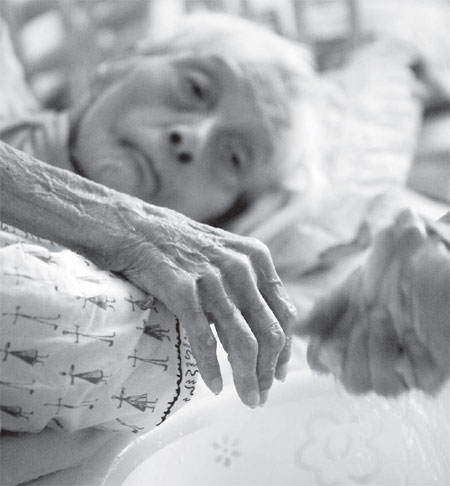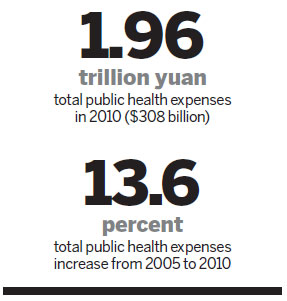The ultimate choice
 |
|
An elderly woman lies on her bed as a nurse washes her hand in a Beijing hospice. Provided to China Daily |
While it is natural to try and preserve life at all costs perhaps there is a point when it is wisest to accept the reality? Wang Ru reports.
Lu Xun, one of the country's greatest writers, published the essay My Father's Illness in 1930.
In the essay, the doctor-turned-writer describes how quack doctors used traditional herb medicines to "treat" and eventually ruin his father.
"China's filial sons buy ginseng to feed their dying parents in the hope of seeing their parents breathe a few more days, but my Western medical teacher taught me that if the treatment is in vain, let the patient die without pain," the author wrote.
In 2008, Wang Xiao, 56, a retired college professor in Taiyuan, Shanxi province, buried his mother, who suffered a brain tumor and died in his arms at home.
At the funeral, amid the sorrow, Wang had to face sniping criticisms from fellow villagers and even some relatives.
After the cancer was diagnosed at a late stage, the doctor informed Wang that chemotherapy would not help. Only a gamma knife operation might prolong her life, but this might still be a risk for the 71-year-old patient.
Having talked with his family, Wang decided to remove his mother from hospital and live with her. He gave up Western medicine and only fed his mother traditional Chinese medicines, to improve her appetite.
"I wanted to stay with my mother during the remaining days of her life, giving my final filial piety, rather than seeing her suffering in the crowded hospital," Wang says. "I think I made the right decision, because my mother passed away in peace."
Yet, "Some of my neighbors murmured during the funeral that I didn't want to spend money to save my own mother," says Wang, sighing during our telephone interview.
Wang's story is not a rare one. In May, Chen Zuobing, a doctor with 23 years of clinical experience at a hospital in Zhejiang province, wrote a blog on a similar theme.
Chen gave up treatment on his 78-year-old father who was diagnosed with a malignant tumor. He accompanied his father during his last days, cooking for and taking care of him.
"There are 10,000 ways to die, we chose the one with respect for life," Chen wrote in his blog.
Chen's story was widely reported and his blog had more than 6,000 comments, both for and against.
"An old Chinese saying goes, 'Better live than dead', but it shouldn't apply to people like Chen's father. It is time to take a breath from the heavy traditional burden," says Wang Pan, who writes for a newspaper in Henan province.
"My mother lived three more years after she was diagnosed with malignant cancer under treatment," says writer Du Xiping, who has an opposing opinion about the matter.
"Different people have different choices To die peacefully or to face the treatment bravely, both deserve respect," says Wei Yingjie, a columnist in Zhejiang province.
In 2011, when Chen visited Gloucestershire Royal Hospital in England, he discovered that the procedure for giving up treatment on late period patients required evaluation from a veteran medical consultant and agreement from more than two doctors.
In China, traditional moral values suggest that people shouldn't give up on trying to cure their parents, partners and children. In most circumstances, people choose to listen to doctors and to receive treatment, whatever the cost.
In a famous case in 2010, 43-year-old Wu Jiang, in Xinjiang Uygur autonomous region, sued his father, who stopped treating his 69-year-old wife, who died of a tumor. His appeal wasn't accepted by the local court.
"More than 90 percent of patients with early period cancer can be healed and most patients' lives can be prolonged for years. So the patients' families need to know the conditions clearly instead of giving up treatment blindly," says Zhang Fan, deputy director of the gamma knife department of No 411 Hospital in Shanghai.
"As doctors, we are devoted to saving patients as long as there is hope. There is no law so far to regulate when to give up or continue treatment. Doctors inform the patients' families and let them make their own decision," says Liao Shaofang, director of the emergency department of Tsinghua University No 1 Hospital.
"If I were the patient and couldn't get the necessary treatment, I would choose to end my life, instead of living in pain and causing a burden on society and families. But as a doctor, I have no right to deprive anyone of the opportunity of living," Liao says.























